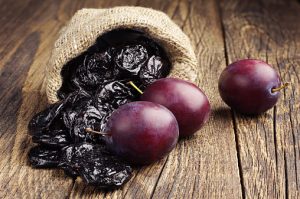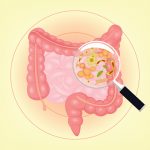New research suggests that dried plums may reduce the risk of colon cancer by having a positive affect on healthy gut bacteria. Colon cancer is expected to cause close to 50,000 deaths across the United States this year. It is the third leading cause of death in the country.
 Researchers at Texas A&M University and the University of North Carolina examined the tissues, as well as the contents, of different segments of animal colons.
Researchers at Texas A&M University and the University of North Carolina examined the tissues, as well as the contents, of different segments of animal colons.
The results indicated that a diet of dried plums – also known as prunes – increased two major gut bacteria, beneficial microbiota, in the distal colon.
This was without affecting the proximal colon. The distal is the left side or last part of the colon that connects to the rectum, while the proximal is the right side of the colon that connects to the small intestine.
The team also discovered that the consumption of dried plums reduced the number of precancerous lesions in rats. The lesions are a strong sign of future cancer development.
While the results do suggest regularly eating prunes is good for colon health and may reduce the risk of colon cancer, human studies are required.
Previous research indicates that interruptions in the microbiota or gut bacteria are involved in intestinal inflammation. It is believed that intestinal inflammation can promote the development of colon cancer.
Gut bacteria and colon cancer risk
 A healthy gut includes a range of bacteria. Our age, what medications we take, infections we might get and our overall health determine whether our gut microbiome loses volume or diversity.
A healthy gut includes a range of bacteria. Our age, what medications we take, infections we might get and our overall health determine whether our gut microbiome loses volume or diversity.
For example, if a person takes antibiotics, the strains of bacteria are not killed equally. The good bacteria are more fragile, the bad bacteria more stubborn. This means that often times the medication kills the infection and destroys good bacteria at the same time.
Without good bacteria, the bad bacteria can produce toxins, which can cause intestinal inflammation.
Scientists have known for some time that people with colon cancer have different microbial communities than those without the life-altering disease.
However, they wondered if it was the bacteria that triggered the cancer or shifts caused by malignant growths. Researchers at the University of Michigan put this question to the test. They removed samples of the microbiome from mice that were injected with cancer to develop colon tumors, then transplanted them into healthy mice.
These mice suddenly developed twice the number of tumors than animals that were transplanted with non-cancerous microbiome, making the gut bacteria and colon cancer risk association clear.
Other risk factors for colon cancer
While beneficial microbiota has been connected to a healthy colon, and while to a large extent inflammation is an enemy, there are other risk factors to look at. Here is an overview of some common factors that can increase the risk of colon cancer.
- Diet

A diet that is high in red meat and processed meats can increase the risk of colon cancer. Studies show cooking meats at very high temperatures creates a chemical that might increase cancer risk.
- Physical inactivity
A sedentary lifestyle is a risk factor for colon cancer. Obesity also raises the risk for men and women, although statistics show it is stronger in men.
- Smoking
Although smoking is mainly associated with lung cancer, it is also a cause of colon cancer.
- Alcohol consumption

Heavy alcohol consumption can lead to colon cancer. Studies show this is because it can lead to low levels of folic acid in the body.
People who suffer from inflammatory bowel disease, irritable bowel disease, have experienced colorectal polyps, or people who have a family history of colon cancer can be at higher risk.
Colon cancer fighting foods besides prunes
 The study on dried plums provides promising evidence that food can make a difference when it comes to colon
The study on dried plums provides promising evidence that food can make a difference when it comes to colonhealth. Prunes are not the only colon cancer fighting food item being discussed by the medical community. Our microbial metabolism process depends on nutritious, fat free, antioxidant-rich food.
The Johns Hopkins anti-colon cancer diet calls for plenty of colored fruits and vegetables and fresh fish at least one to three times per week. Limiting red meat and alcohol is also part of their plan.
Nutritional experts believe that if we make even moderate diet and lifestyle changes we can prevent as much as 70 percent of colon cancers.
Here’s a sample of what we can include in our diet to help maintain a healthy colon:
 Lentils
Lentils- Cruciferous vegetables, such as broccoli, cabbage, brussel sprouts, and kale
- High fiber whole grains
- Turmeric spice
- Fish, such as salmon and mackerel
- Garlic and onions
- Black and green tea
- Tomatoes
- Berries
 Good nutrition and diet are vital if we want to prevent all kinds of diseases, including colon cancer. Eating less fat is especially important for colon health. This is why we have to pay close attention to the meat we consume. Hi
Good nutrition and diet are vital if we want to prevent all kinds of diseases, including colon cancer. Eating less fat is especially important for colon health. This is why we have to pay close attention to the meat we consume. High fat consumption can increase the bile acids in our digestive tract. When bile acids get to our colon, they can promote tumor growth.
On the other hand, vitamins and minerals, including folic acid, seem to keep us healthy. Some evidence suggests that folic acid found in citrus fruits and leafy vegetables is a great food in the fight against colon cancer.
While prunes just might be able to keep this type of cancer at bay, it’s nice to know that those who aren’t exactly pleased about plums do have other options.
References:
http://www.sciencedaily.com/releases/2015/09
http://today.agrilife.org/2015/09/24/plum-good-health-benefits
http://www.canceractive.com/cancer-active-page
http://healthland.time.com/2013/11/05/colon-cancers-newest-culprit-gut-bacteria
http://www.cdc.gov/cancer/colorectal/basic_info/risk_factors
http://www.cancer.org/cancer/colonandrectumcancer/detailedguide/colorectal-cancer-risk-factors
http://www.besthealthmag.ca/best-eats/nutrition/foods-that-fight-colon-cancer
http://www.hopkinscoloncancercenter.org/CMS/CMS
http://www.webmd.com/colorectal-cancer/guide/eating-prevent-cancer
http://today.agrilife.org/2015/09/24/plum-good-health-benefits
http://www.canceractive.com/cancer-active-page
http://healthland.time.com/2013/11/05/colon-cancers-newest-culprit-gut-bacteria
http://www.cdc.gov/cancer/colorectal/basic_info/risk_factors
http://www.cancer.org/cancer/colonandrectumcancer/detailedguide/colorectal-cancer-risk-factors
http://www.besthealthmag.ca/best-eats/nutrition/foods-that-fight-colon-cancer
http://www.hopkinscoloncancercenter.org/CMS/CMS
http://www.webmd.com/colorectal-cancer/guide/eating-prevent-cancer
No comments:
Post a Comment